Electrolyte drinks are specialized beverages formulated to replenish fluids and minerals that are lost during various physiological processes, including sweating, urination, and when in a state of ill health.
They are especially significant in managing hydration levels in the body, making them a valuable tool for individuals dealing with a range of health conditions.
The balanced mix of electrolytes, such as sodium, potassium, calcium, and magnesium, in these drinks is essential for maintaining proper cellular function, muscle contraction, and nerve impulses.
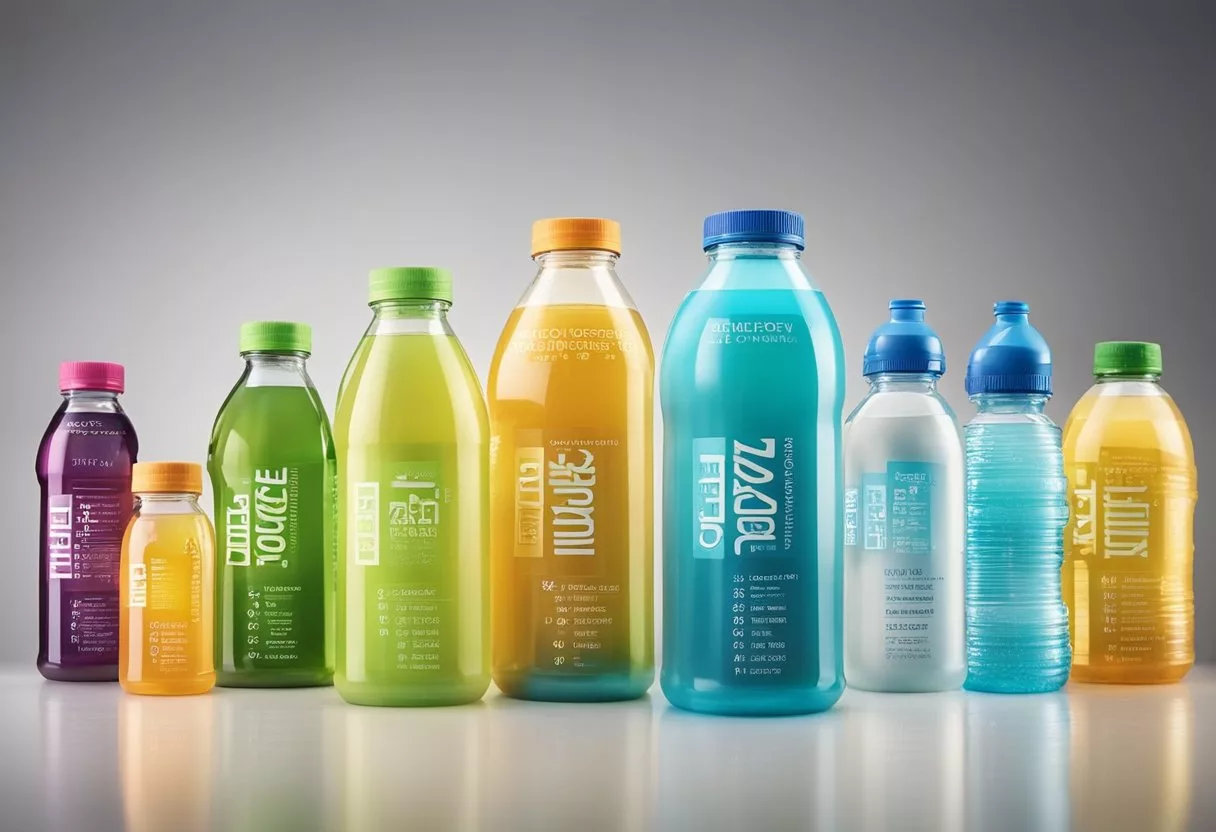
The role of electrolyte drinks extends beyond sports and exercise into therapeutic realms. For individuals experiencing conditions that affect fluid balance, like fever, diabetes, or blood pressure irregularities, electrolyte drinks can offer a supportive measure to aid management. They can also be integral in recovery from health issues such as urinary tract infections, migraines, or postural orthostatic tachycardia syndrome (POTS), where electrolyte imbalance may occur. It is important, however, to select the appropriate type of electrolyte drink, as formulations and concentrations vary widely. What may be beneficial for one condition could be detrimental for another.
Key Takeaways
- Electrolyte drinks aid in maintaining hydration and replenishing minerals lost during health-related conditions.
- Choosing the right electrolyte drink can help manage specific health issues, such as blood pressure fluctuations or diabetic concerns.
- Appropriate selection and usage of electrolyte drinks contribute to improved cellular function and overall health maintenance.
Electrolytes and Hydration
Electrolytes are essential minerals crucial for maintaining fluid balance in the body, and hydration is the process of ensuring that the body has adequate fluids. Both are integral to overall health and proper physiological function.
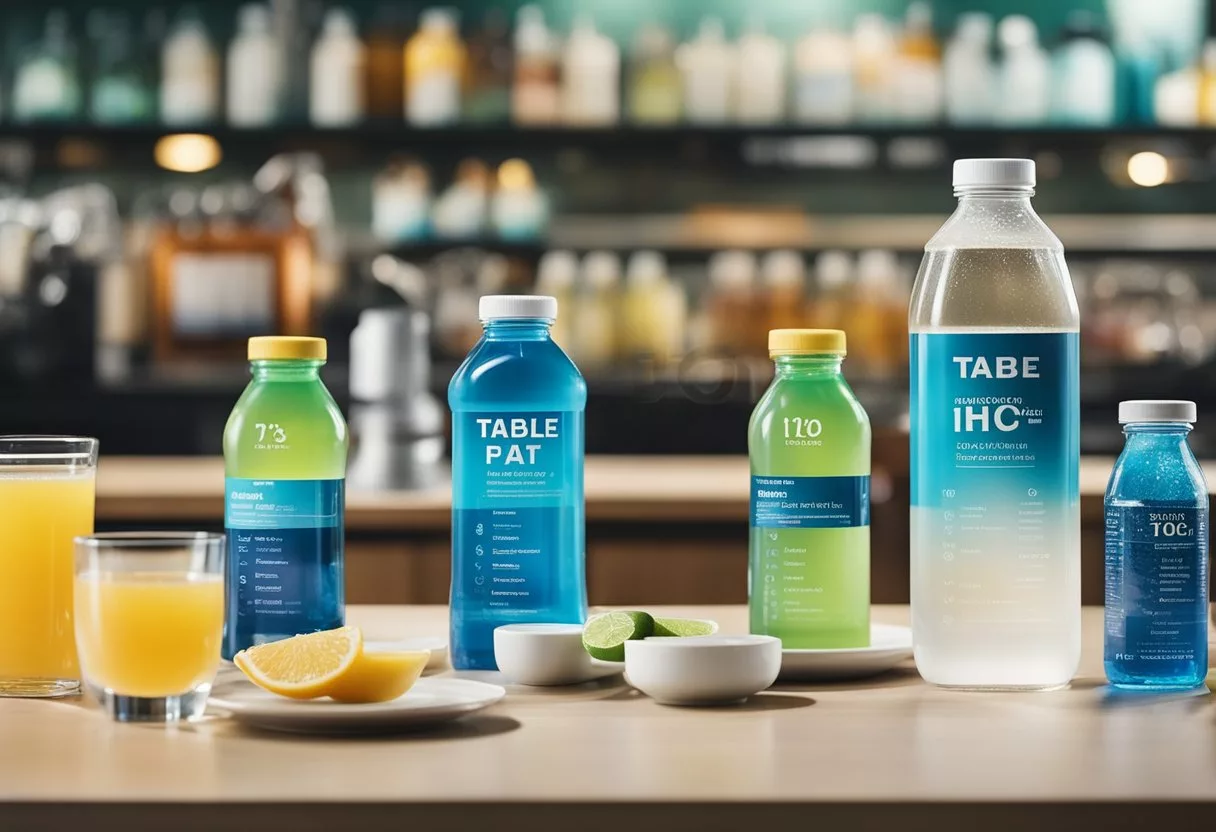
Role of Electrolytes in the Body
Electrolytes, including sodium, potassium, magnesium, and calcium, are minerals with an electric charge. They are found in bodily fluids and are vital for conducting electrical impulses that power nerve responses and muscle contractions. Chloride and phosphorus are other electrolytes that aid in fluid balance and are necessary for energy production and structural integrity of cell membranes, respectively.
- Sodium helps regulate blood pressure and volume.
- Potassium is necessary for proper heart function and muscle contraction.
- Magnesium plays a role in over 300 enzymatic reactions, including energy creation and muscle movements.
- Calcium is not only crucial for bone health but also for blood clotting and nerve signal transmission.
Importance of Hydration for Health
Hydration refers to the body maintaining a proper fluid balance, which is vital for health and well-being. Water is a major component of cells and is necessary for them to function. Adequate hydration facilitates the transportation of electrolytes to and from cells, supporting essential minerals to perform their functions effectively.
- Hydration aids in fluid balance, preventing both dehydration and overhydration.
- It ensures that electrolytes are evenly distributed across cell membranes, aiding in muscle function and nerve signaling.
- Proper hydration supports kidney function, allowing for efficient waste excretion and regulation of bodily electrolyte levels.
Health Benefits and Usage of Electrolyte Drinks
Electrolyte drinks offer benefits that range from supporting athletes to managing dehydration during health challenges. They provide a balance of essential minerals for the body to maintain proper function.
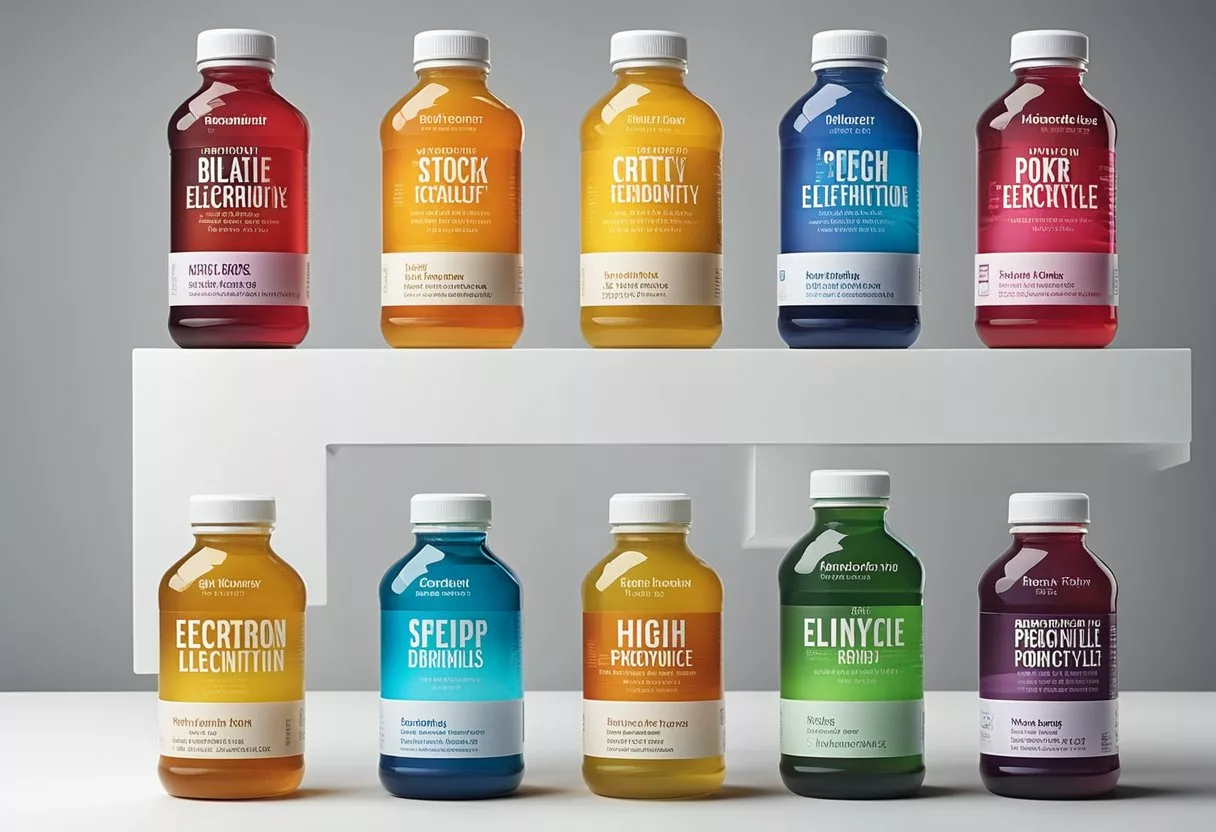
Optimal Hydration for Athletes
For athletes engaging in intense exercise, electrolyte drinks are a valuable tool. They help replace minerals lost through sweat, ensuring the body maintains a balance necessary for peak performance. A drink that adequately replenishes these lost electrolytes can contribute to optimal hydration and prevent dehydration. Studies suggest that a properly formulated sports drink can rehydrate athletes more effectively than water alone during or after a workout.
Electrolyte Replacement During Illness
During episodes of illness that involve vomiting or diarrhea, the body loses vital electrolytes and fluids. Consuming electrolyte drinks can be crucial in helping to quickly and effectively replenish those nutrients. This can promote rehydration and aid in recovery, offering a more targeted hydration solution compared to standard water intake.
Daily Electrolyte Maintenance
Even outside of sports and illness, a daily intake of electrolyte drinks can help maintain the body’s hydration levels. They serve as a supplemental source of minerals for individuals who might not get enough from their diet, supporting overall bodily functions in a neutral and balanced manner. Care should be taken not to overconsume these drinks, as the balance of electrolytes is critical for health.
Key Components of Electrolyte Drinks
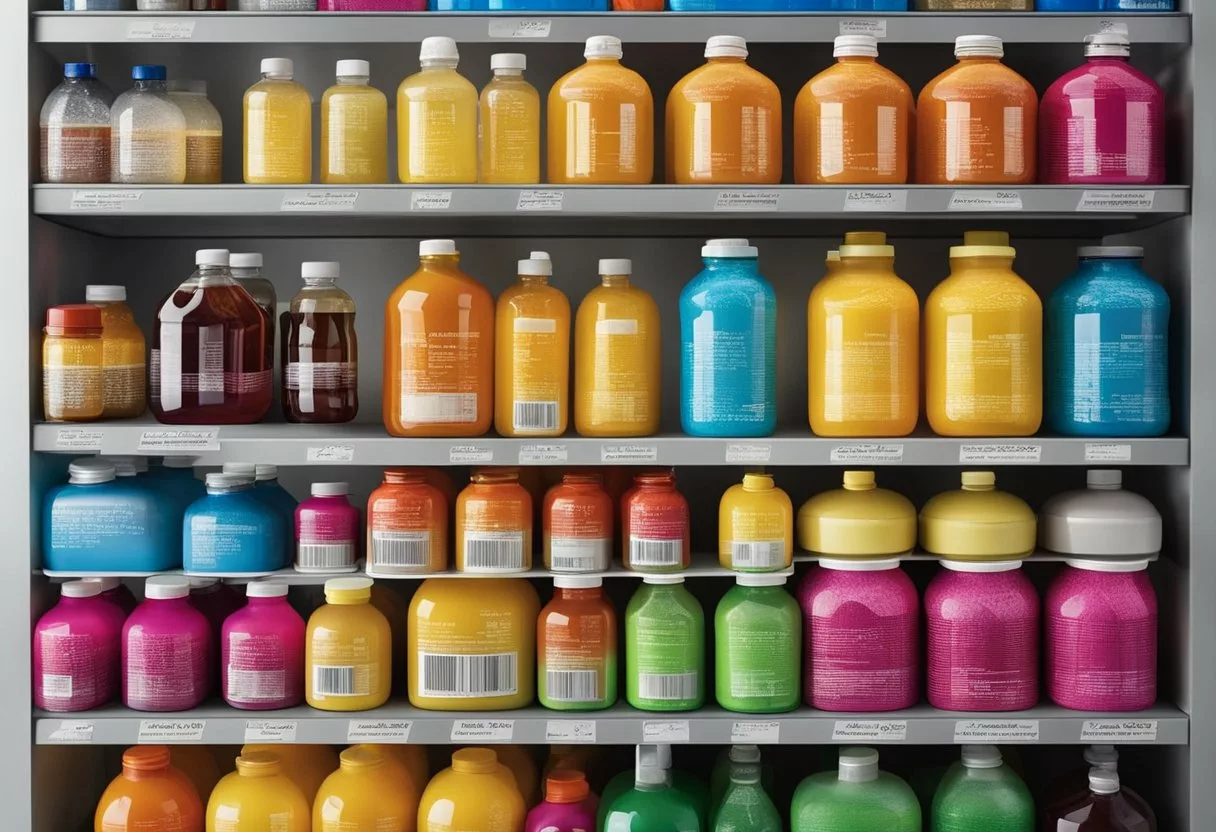
Electrolyte drinks are formulated to replenish vital minerals and nutrients lost during dehydration, with specific ingredients to maximize their effectiveness.
Sugars and Sweeteners in Electrolyte Drinks
Many electrolyte drinks include sugar which facilitates the absorption of minerals into the body. These drinks often contain sweeteners to enhance flavor, making them more palatable. For example, sugar also provides athletes with the carbohydrates needed to fuel their exercise, which can be vital for endurance sports.
Balancing Minerals for Optimal Effectiveness
The mineral content in electrolyte drinks typically includes sodium, potassium, and magnesium — key electrolytes that maintain hydration and muscle function. The balance of these minerals is crucial for the drink’s effectiveness, as it needs to mimic the body’s natural electrolyte composition to be beneficial.
Low Sugar and Sugar-Free Alternatives
For those monitoring their sugar intake, there are low sugar and sugar-free alternatives that utilize artificial sweeteners or natural sweeteners like stevia and monk fruit. These alternatives provide the necessary electrolytes with minimal or no sugar content, making them suitable for a broader range of dietary preferences.
Different Types of Electrolyte Drinks
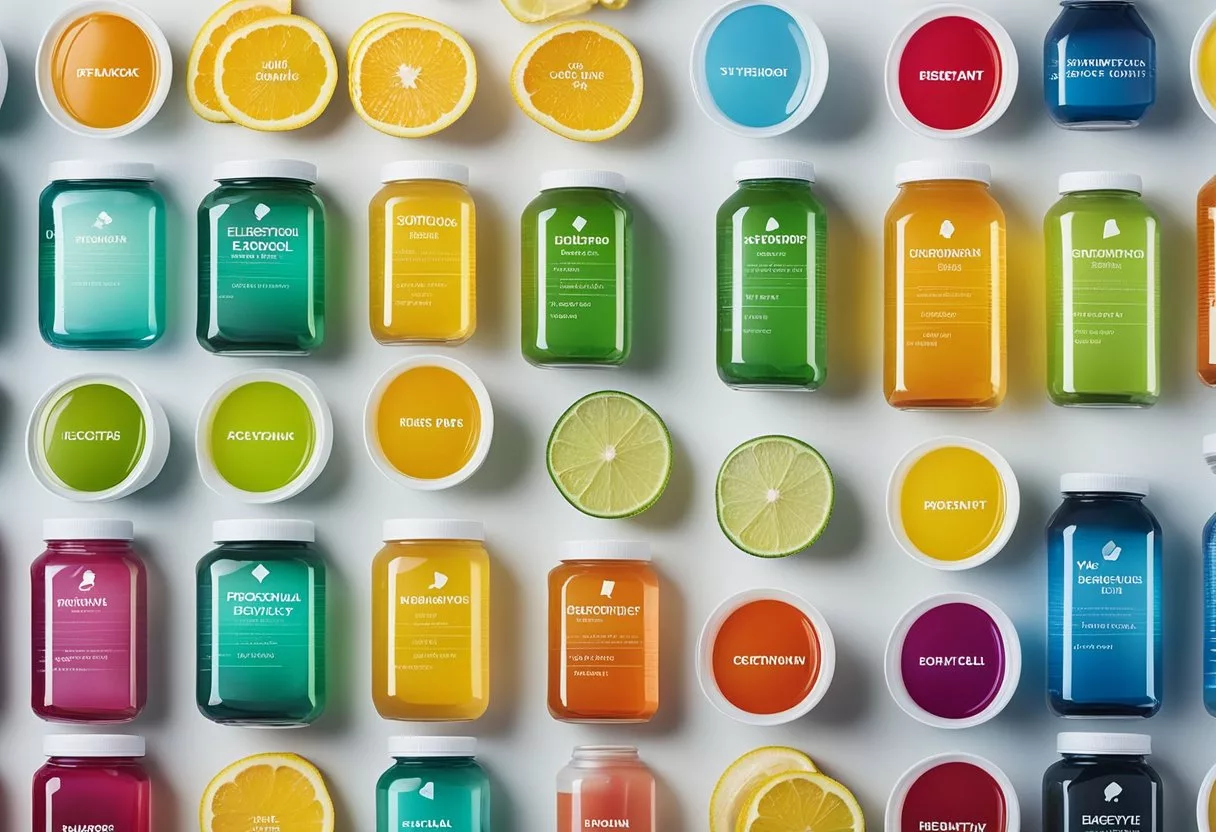
Electrolyte drinks come in various forms, each designed to cater to specific needs and preferences. From readymade sports drinks found abundantly in markets to customizable powders and natural options like coconut water, consumers have a myriad of choices to maintain electrolyte balance.
Sports Drinks and Their Market Presence
The sports drinks industry is a massive market, with brands like Gatorade and Powerade leading the pack. These beverages are formulated to replenish electrolytes lost during intense exercise and commonly contain a mix of sodium, potassium, and carbohydrates. They are readily available in stores and are a popular choice among athletes for quick hydration.
Natural Sources and Coconut Water
For those seeking a more natural hydrating solution, coconut water is a favored alternative. It is a rich source of potassium and other minerals, offering a lower calorie option compared to typical sports drinks. Dietitians often recommend coconut water as a natural electrolyte replenisher, especially for individuals with mild hydration needs or those looking for a non-processed option.
Tablets, Powders, and Other Concentrates
When convenience and customization are key, electrolyte tablets and powders offer a personalized hydration solution. Products like Pedialyte and electrolyte powder mixes allow consumers to adjust the concentration of their drinks to match their specific hydration needs. These options have gained popularity for their portability and for offering a range of flavors and formulas that can cater to dietary preferences and restrictions.
Guidelines for Selecting the Right Electrolyte Drink
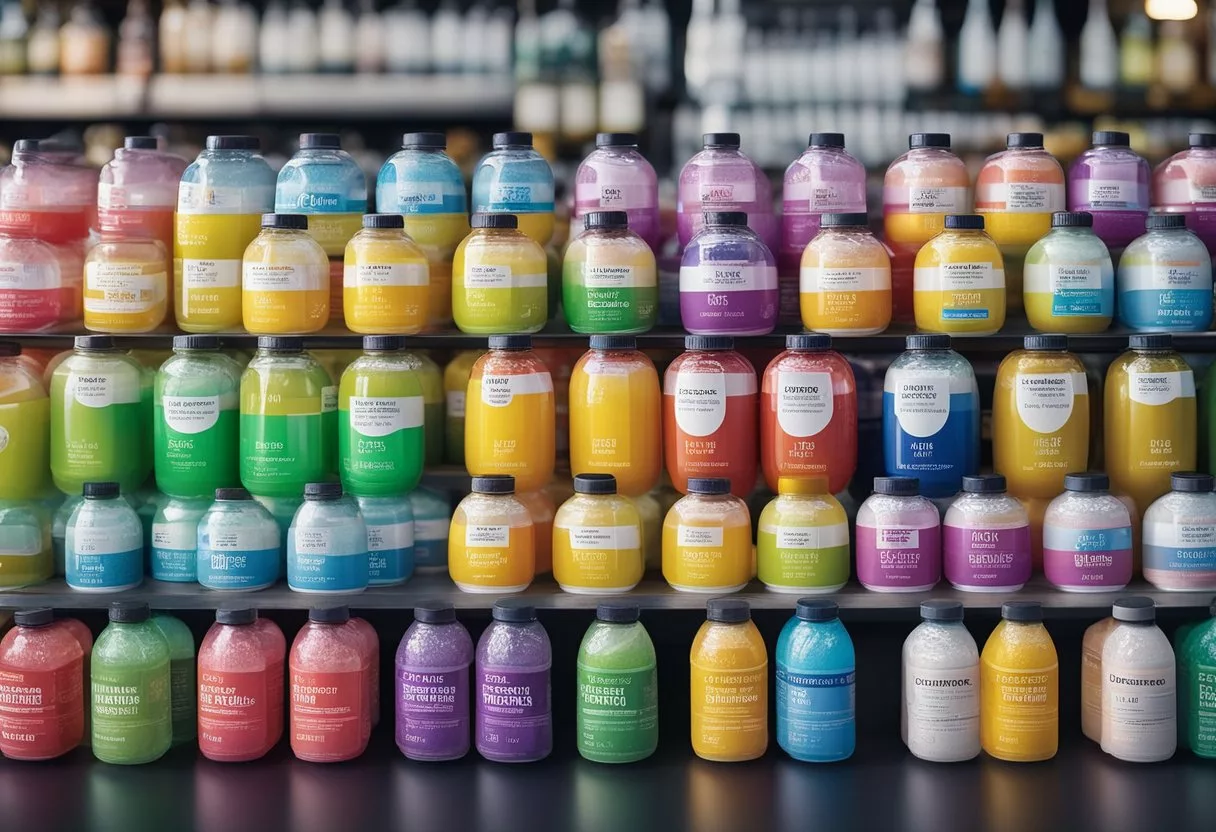
When choosing an electrolyte drink, it is crucial to consider the specific ingredients, the value it offers, and how it aligns with individual health conditions and dietary needs. Recommendations from healthcare providers should also guide the selection process.
Analyzing Ingredients and Nutritional Information
One should meticulously examine the ingredients and nutritional content of an electrolyte drink. Look for drinks with an appropriate balance of electrolytes such as sodium, potassium, and magnesium. It’s also important to check for added sugars or artificial additives which might not suit everyone’s taste or dietary preferences. Labels providing clear nutritional information can assist in making an informed choice that matches both taste preferences and the nutritional value one seeks.
Considering Health Conditions and Dietary Needs
Personal health conditions significantly influence the choice of an electrolyte drink. Those with conditions such as high blood pressure or diabetes should opt for low-sugar or sugar-free variants. Similarly, individuals with dietary restrictions, for example, those who are vegan or allergic to certain ingredients, must scrutinize product labels to ensure the drink is compatible with their dietary needs.
Recommendations from Healthcare Providers
Consultation with healthcare providers is essential, especially when selecting an electrolyte drink for managing health conditions. They can offer tailored advice that takes into account medical history and current health status. This professional guidance can be valuable in finding an electrolyte drink that effectively supports hydration without compromising health.
The Impact of Electrolyte Drinks on Physical Performance
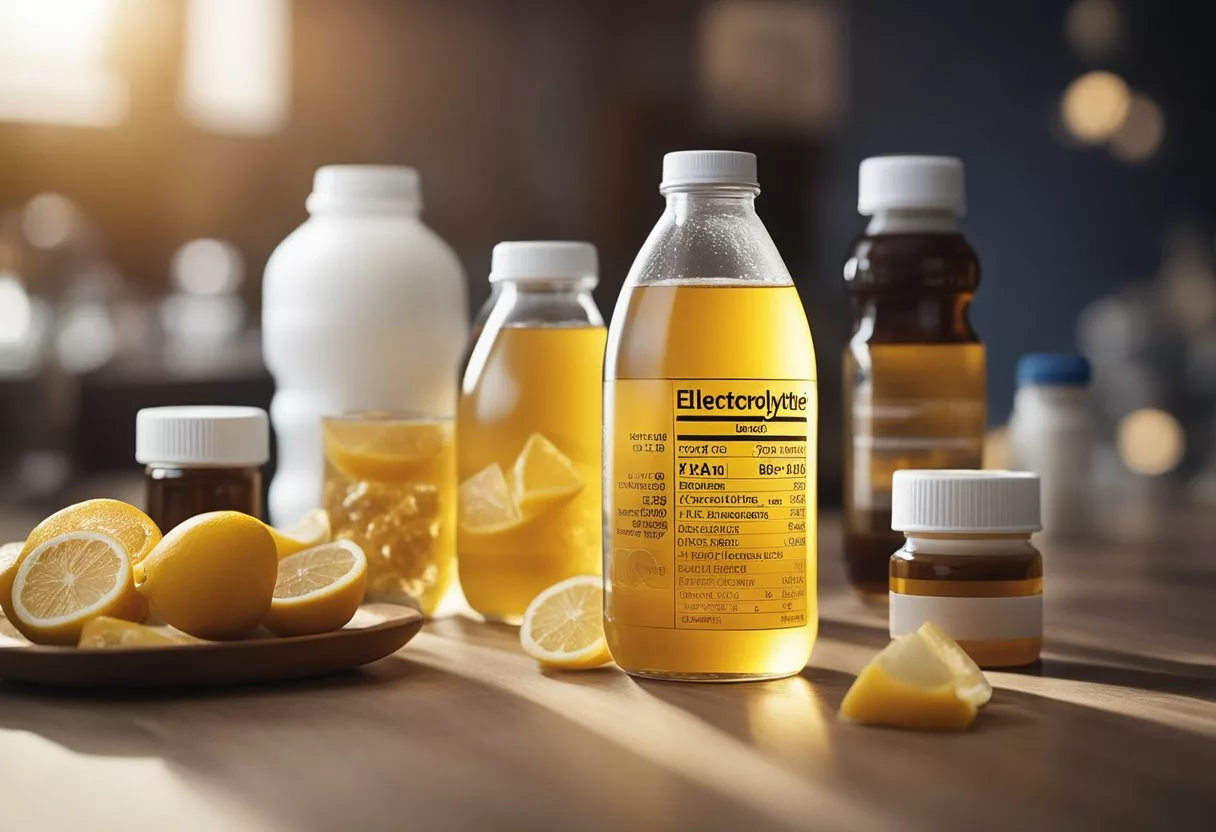
Electrolyte drinks are formulated to replenish minerals lost through sweat during physical activity. This can enhance performance, aid in workout recovery, and mitigate fatigue.
Boosting Athletic Performance and Recovery
Electrolyte drinks provide a balance of electrolytes such as sodium and potassium that are crucial for maintaining hydration levels. This balance is essential for optimal muscle contraction and function during exercise. By consuming these drinks, athletes can improve their performance and accelerate recovery post-workout.
Preventing Muscle Cramps and Fatigue
Muscle cramps are often a result of electrolyte imbalance and dehydration. Electrolyte drinks can prevent cramps by ensuring the muscles have the necessary minerals to function efficiently. Furthermore, these beverages play a role in delaying fatigue during prolonged physical performance, allowing athletes to train longer and harder.
Enhanced Endurance in High-Intensity Workouts
During high-intensity workouts or races, a rapid loss of electrolytes can occur. Electrolyte drinks can help sustain energy levels, enhance endurance, and prevent the decline in performance that can accompany the depletion of electrolytes. They act as a critical workout recovery drink, replenishing what the body has lost.
Safety and Risks Associated with Electrolyte Drinks
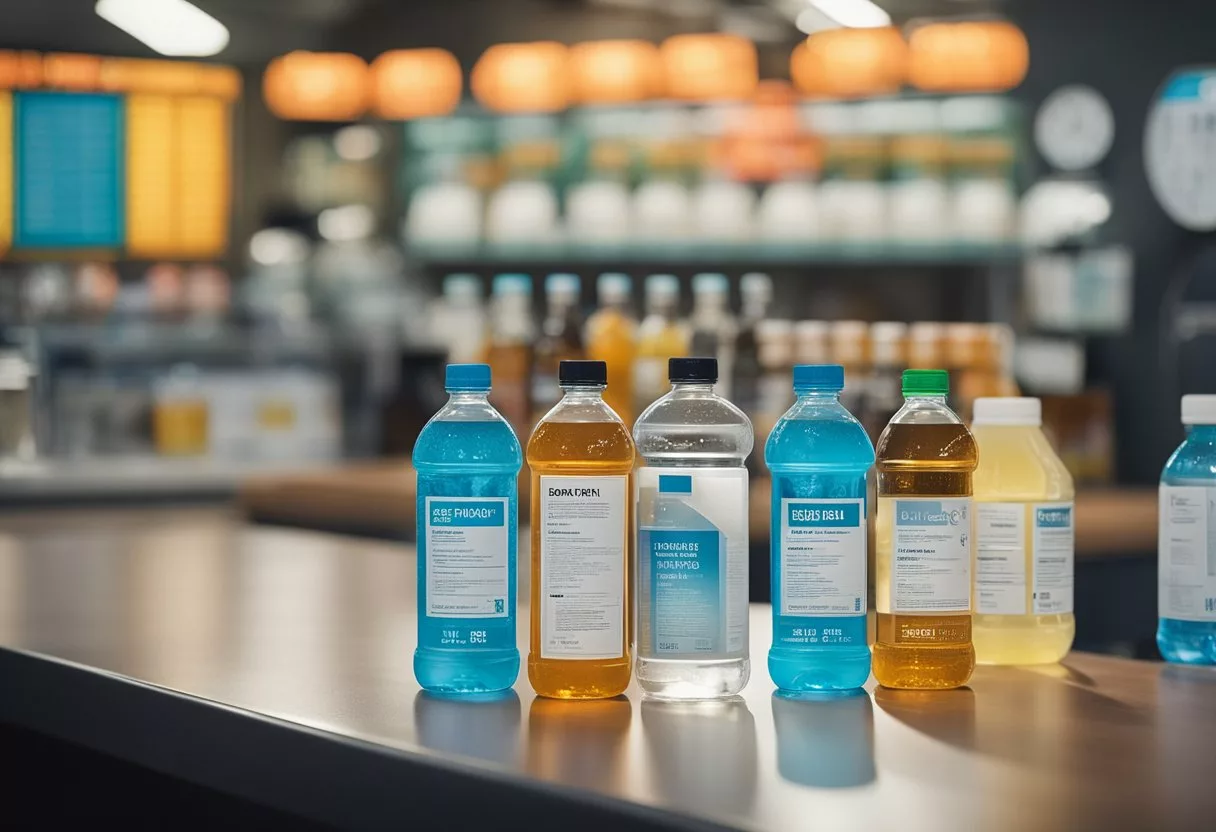
Electrolyte drinks, while beneficial for hydration and sports performance, present various health risks if consumed improperly. It is imperative to understand these factors to prevent potential health complications.
Overconsumption and Electrolyte Imbalance
Overconsuming electrolyte drinks can lead to electrolyte imbalance, which manifests in multiple forms. Conditions such as hyponatremia (low sodium) and hypernatremia (high sodium) can occur, with symptoms ranging from nausea to muscle weakness. Hyperkalemia, an excess of potassium in the bloodstream, is another serious condition that one might encounter due to imbalance.
Heart Disease and High Sodium Risks
For individuals with heart disease, the high sodium content in some electrolyte drinks could pose significant risks. Elevated sodium levels can exacerbate heart conditions, leading to increased blood pressure and potentially triggering cardiac events. Such individuals need to choose low-sodium options to mitigate this risk.
Sugar Content and Dental Health Considerations
Many electrolyte drinks contain added sugars to enhance flavor, which, if consumed regularly, can contribute to tooth decay. The continual exposure of teeth to sugary contents can erode enamel and lead to cavities. It is advisable for consumers to look for sugar-free varieties or to maintain proper dental hygiene post-consumption to avoid these dental concerns.
Lifestyle and Non-Exercise Related Usage
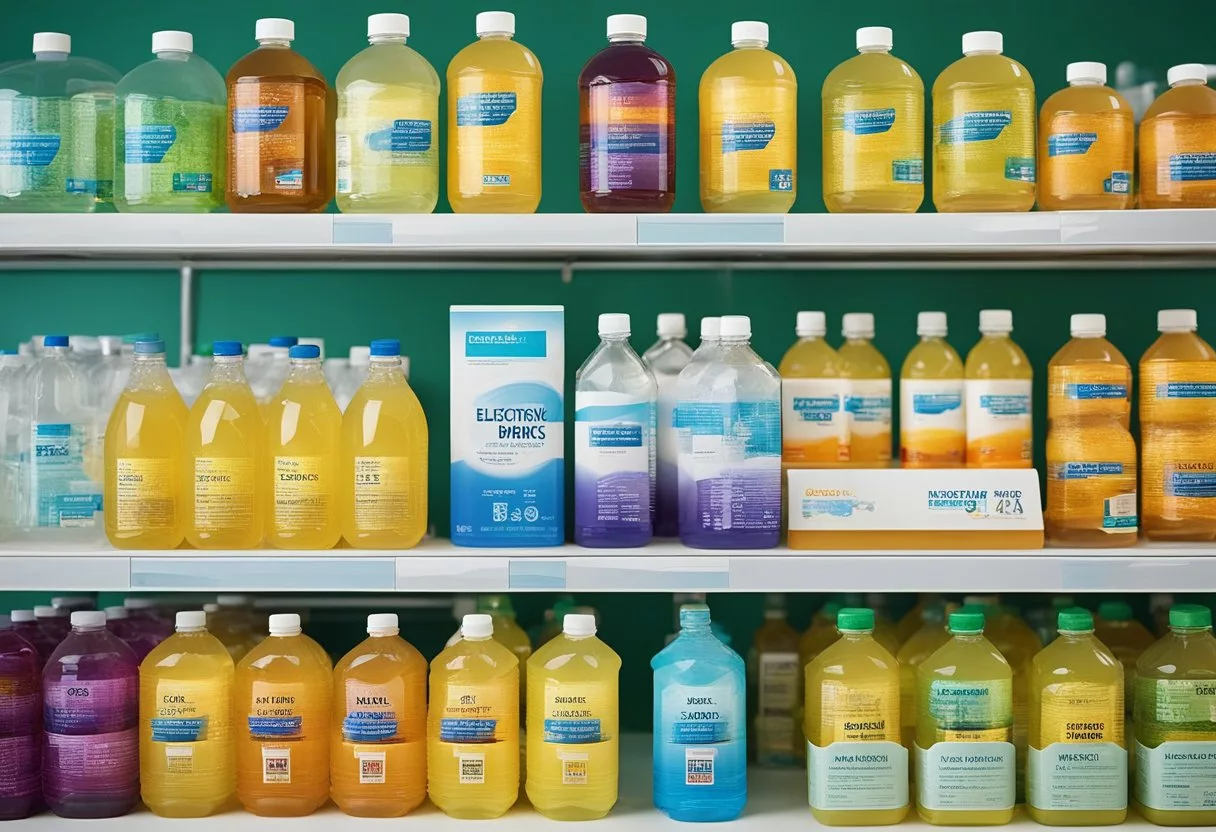
Electrolyte drinks are not solely beneficial for athletes or those engaged in rigorous physical activities. They also serve important functions for those with active daily lifestyles and can be used as a daily supplement to maintain hydration and electrolyte balance.
Daily Replenishment for Active Lifestyles
For individuals with busy, on-the-go lifestyles, staying hydrated is crucial, yet it’s often overlooked. As part of the daily routine, one can integrate electrolyte water or electrolyte-infused beverages to aid hydration. Unlike the high-sugar drinks geared for intense physical activities, those designed for lifestyle uses are often lower in calories and sugar, focusing on the replenishment of essential minerals such as sodium, potassium, calcium, and magnesium.
Electrolyte Drinks as a Daily Supplement
Electrolyte drinks can also be viewed as a daily supplement, particularly for those who may not receive enough minerals from their diet alone. Hydration through electrolyte drinks supports various bodily functions beyond exercise, such as cognitive processes, digestion, and overall cellular function. They can effectively provide a balanced mix of essential electrolytes, benefiting daily supplement needs subtly without the extra energy provided for exercise needs.
Innovations and Trends in Electrolyte Drink Formulations
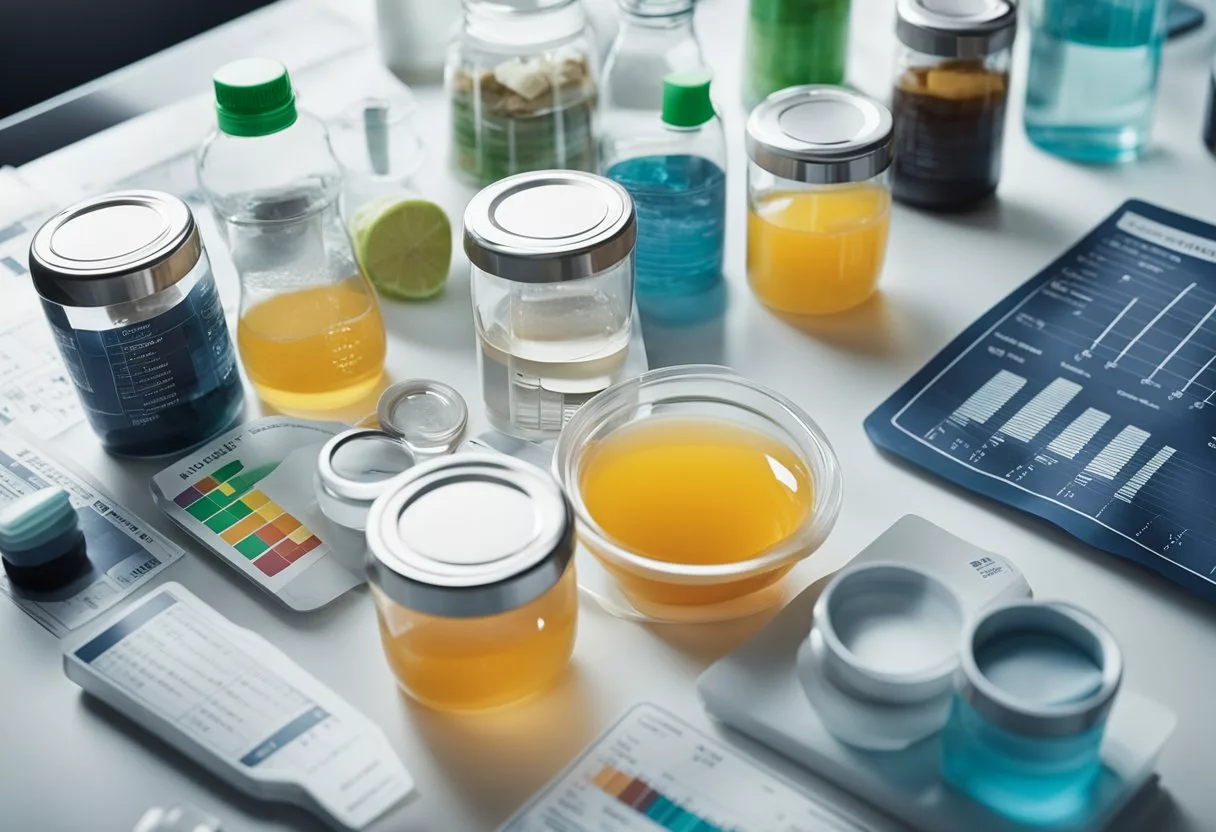
Electrolyte drinks are quickly adapting to consumer health trends with tailor-made formulations designed to improve hydration and exercise recovery. Beverage manufacturers are incorporating emerging ingredients and leveraging advanced technology to meet the evolving demands of active lifestyles.
Emerging Ingredients and Health Trends
Emerging research has sparked an interest in natural ingredients in electrolyte drinks. Manufacturers are phasing out artificial colors and preservatives in favor of organic compounds, which are perceived as healthier options. Ingredients such as coconut water and watermelon juice have gained popularity for their natural electrolytic properties. According to Preventive Medicine Daily, these ingredients also align with the trend towards clean-label products.
- Natural Sweeteners: Stevia and erythritol.
- Plant-Based Ingredients: Spirulina and chlorella.
- Minerals: Increased magnesium and calcium contents.
The health benefits offered by these hydration solutions are expected to help propel the global market to new valuations. Food Business News[1] indicates an uptake in the sector’s growth, with hydration being a significant focus.
The Future of Hydration Technology
Advancements in hydration technology are transforming electrolyte drinks. Ready-to-drink formulations and individualized supplement packets are simplifying hydration processes, increasing the convenience for consumers. There is an uptick in technology that helps personalize hydration, with some advancements allowing consumers to adjust electrolyte levels based on personal needs or environmental factors, such as climate or activity level.
- Personalized Hydration: Customizable electrolyte levels.
- Smart Packaging: QR codes linking to hydration guidelines.
- Environment-responsive Formulations: Varying nutrient levels based on temperature and humidity.
Electrolyte Drinks for Fever
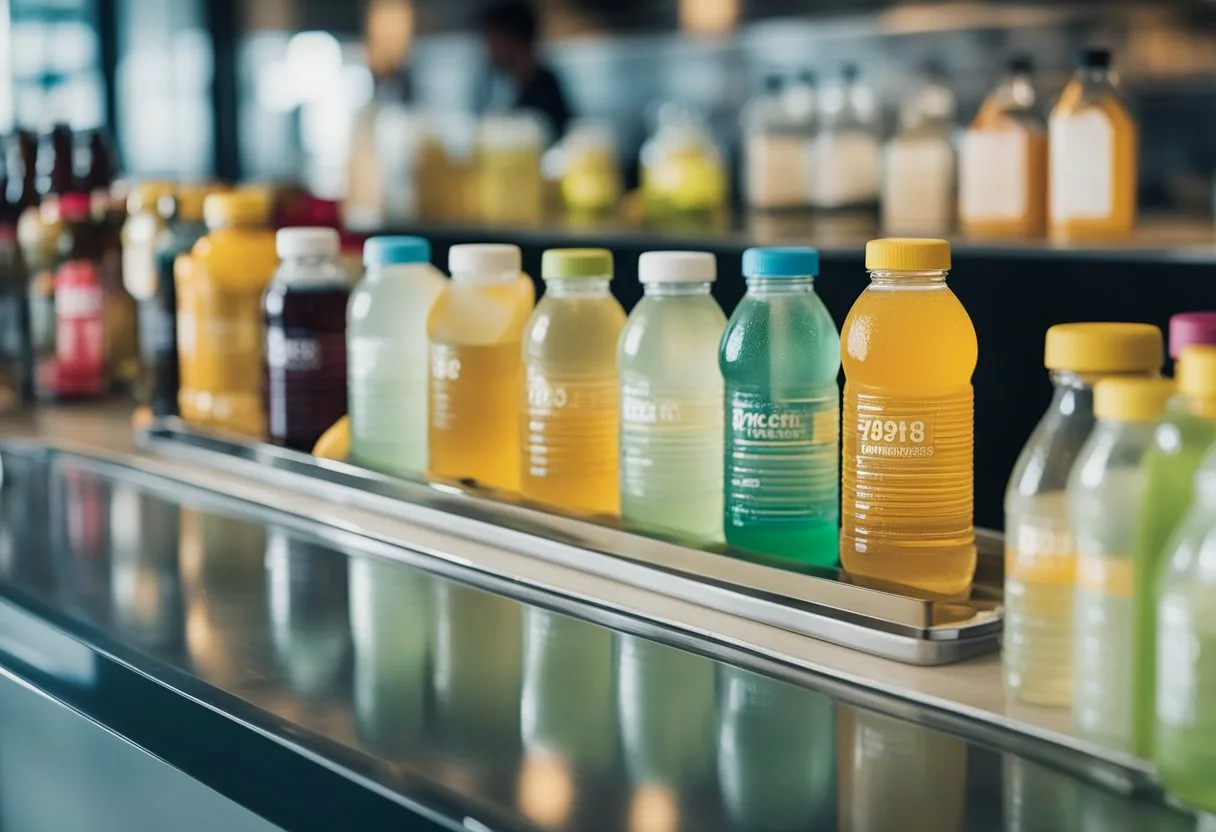
When an individual has a fever, dehydration is a common concern due to increased body temperatures and the potential for fluid loss through sweating. Electrolyte drinks can be beneficial in maintaining proper hydration levels and replenishing lost minerals.
- Key Electrolytes: Sodium, potassium, and chloride are essential during fever, as they can help retain fluid balance and support nerve function.
For someone with a fever, it is important to choose non-caffeinated electrolyte drinks to avoid additional dehydration. A drink with a balanced ratio of electrolytes will help restore the body’s normal fluid levels.
- Sugar Content: While some sugar can aid in electrolyte absorption, it should be minimal to prevent excessive calorie intake.
Fever may cause decreased appetite, so a palatable electrolyte drink with a mild flavor might encourage sufficient fluid intake. The selection of an appropriate electrolyte drink should consider both the electrolyte profile and overall fluid volume to effectively rehydrate.
Here is a suggested structure for electrolyte intake:
| Electrolyte | Suggested Intake |
|---|---|
| Sodium | 460-1150 mg per liter |
| Potassium | 780-1950 mg per liter |
| Chloride | 780-1950 mg per liter |
| Magnesium | 60-75 mg per liter |
| Calcium | 200-240 mg per liter |
While electrolyte drinks can assist in hydration, they should be used in conjunction with water and should not be replaced by medical treatment. It is essential to consult with a healthcare provider to address the underlying cause of the fever and obtain personalized recommendations.
Electrolyte Drinks for Low Blood Pressure
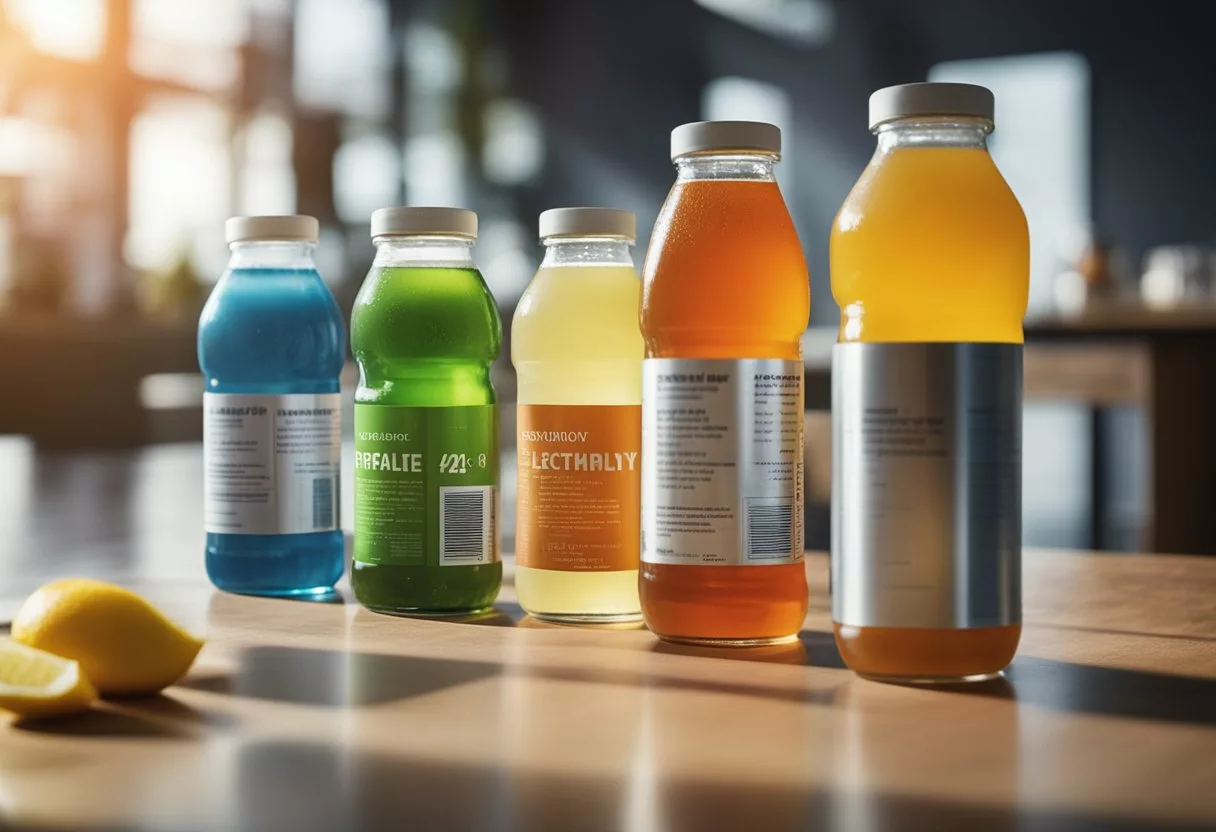
People with low blood pressure may benefit from consuming electrolyte drinks, as they can help in maintaining proper hydration and supporting cardiovascular function.
Sodium is a crucial electrolyte that can aid in increasing blood pressure to healthy levels. When selecting an electrolyte drink for low blood pressure, one should look for options with a higher sodium content.
Here are some key points to consider:
- Rehydration: Electrolyte drinks quickly rehydrate the body, which can be especially beneficial for those experiencing low blood pressure due to dehydration.
- Balance: They help replenish essential minerals and maintain electrolyte balance, crucial for blood pressure regulation.
Examples of suitable electrolyte drinks include:
| Brand | Sodium Content | Additional Features |
|---|---|---|
| Buoy Electrolyte Drops | High | No added sugars, easy to add to any drink |
| Skratch Labs Sport Mix | Moderate to high | Specifically designed for high-intensity activities |
| Tailwind Nutrition Fuel | High | Contains caffeine for those needing an extra boost |
One must ensure that the electrolyte drink is consumed in moderation, as too much sodium can lead to other health issues. It is recommended to consult with a healthcare provider before incorporating these drinks into one’s diet, especially for individuals with conditions affecting blood pressure.
Electrolyte Drinks for High Blood Pressure
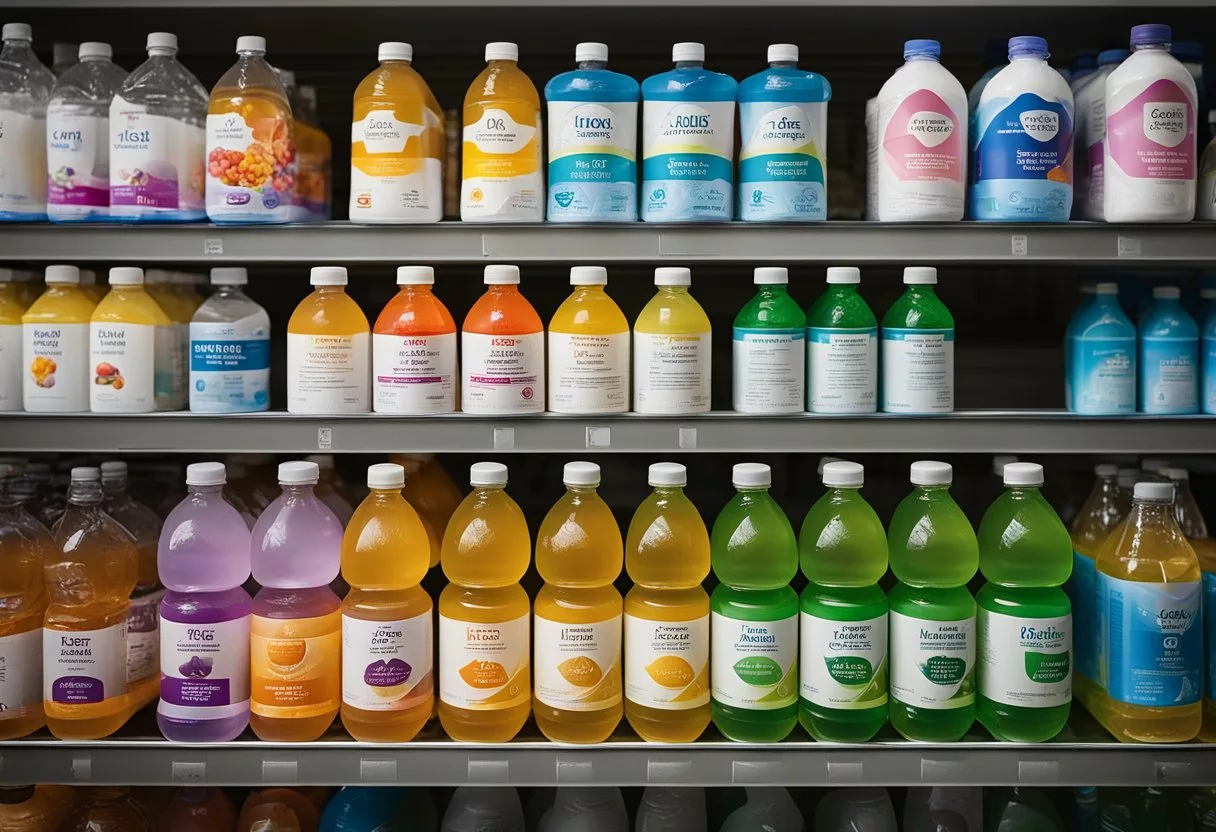
Choosing the right electrolyte drinks can be particularly important for individuals managing high blood pressure. It’s essential to select beverages that are low in sodium and added sugars, as these can exacerbate hypertension.
Key Electrolytes to Consider
- Potassium: This electrolyte helps to counteract the effects of sodium and is vital for heart health. Drinks with added potassium can assist in better blood pressure management.
- Magnesium: Known to support vascular health, magnesium can aid in the relaxation of blood vessels, potentially reducing blood pressure levels.
- Calcium: Integral for proper blood vessel constriction and relaxation, calcium plays a role in maintaining healthy blood pressure.
Recommended Drink Features
- Low Sodium: Look for products specifically labeled as low sodium, as excess salt is to be avoided for high blood pressure.
- No Added Sugars: Excessive sugar intake can lead to weight gain, which is a risk factor for hypertension.
Practical Tips
- Hydration Check: Individuals should ensure they’re adequately hydrated, as dehydration can cause undue stress on the cardiovascular system.
- Read Labels Carefully: It’s important to scrutinize nutritional labels for hidden sources of sodium and sugars.
Electrolyte Drinks for Diabetics
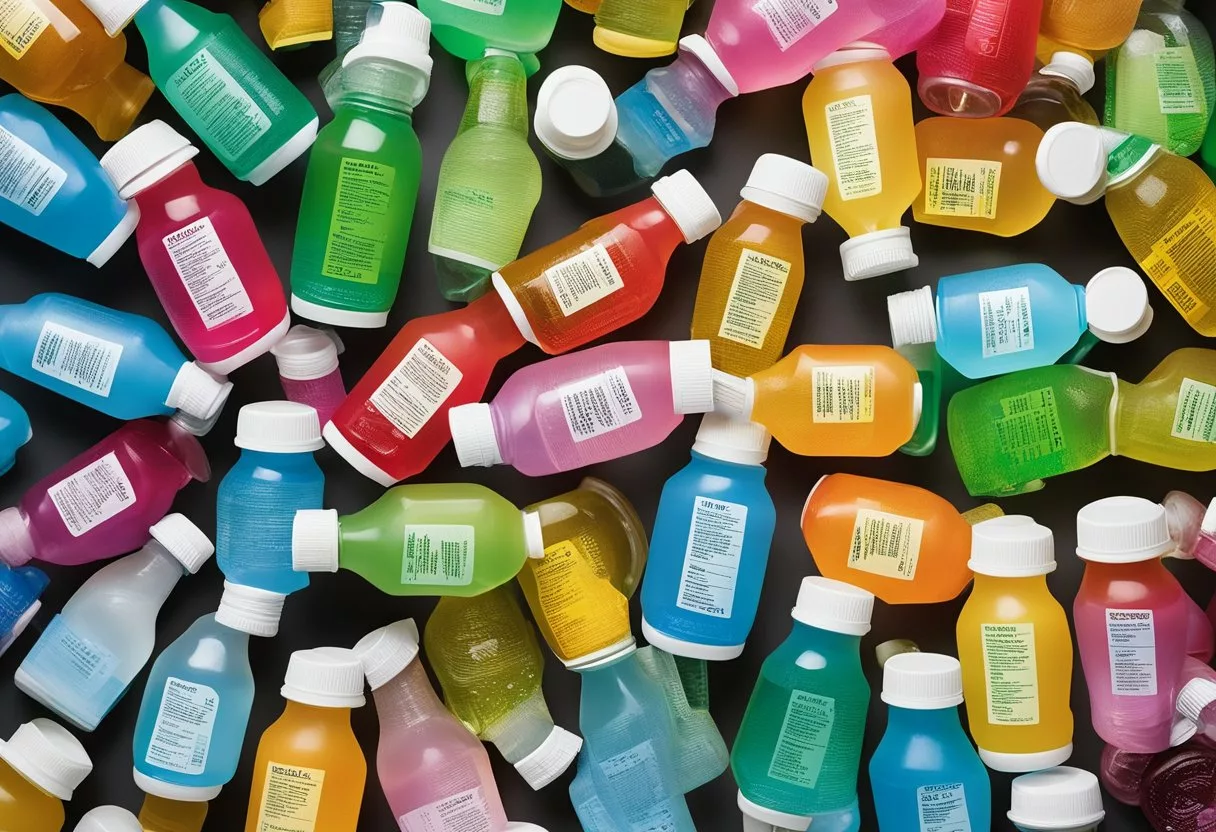
Electrolyte drinks are crucial for maintaining hydration, especially for individuals managing diabetes, who may be more susceptible to dehydration. A prime consideration for diabetics is the sugar content in electrolyte beverages as it can impact blood glucose levels.
Key Components to Consider:
- Low or No Sugar: Select drinks specifically labeled as low-sugar or sugar-free to avoid blood sugar spikes.
- Electrolyte Balance: Look for a balance of essential electrolytes like sodium, potassium, and magnesium.
Recommended Choices:
- Keto Electrolyte Powders: These are typically sugar-free and can be a suitable option for diabetics, allowing for instant hydration without affecting glucose levels.
- DIY Solutions: Combining water, a pinch of salt, and a squeeze of lemon can serve as a homemade electrolyte drink.
Reading Labels:
Diabetics should be diligent about reading nutrition labels. Artificial sweeteners can provide sweetness without the added sugars. Assessing carbohydrates is just as critical; it ensures the drink fits within their dietary plan.
Hydration Tips:
- Sip small amounts throughout the day to maintain optimal hydration levels.
- Monitor blood sugar levels regularly to see how different electrolyte drinks affect your glucose.
Electrolyte Drinks for POTS
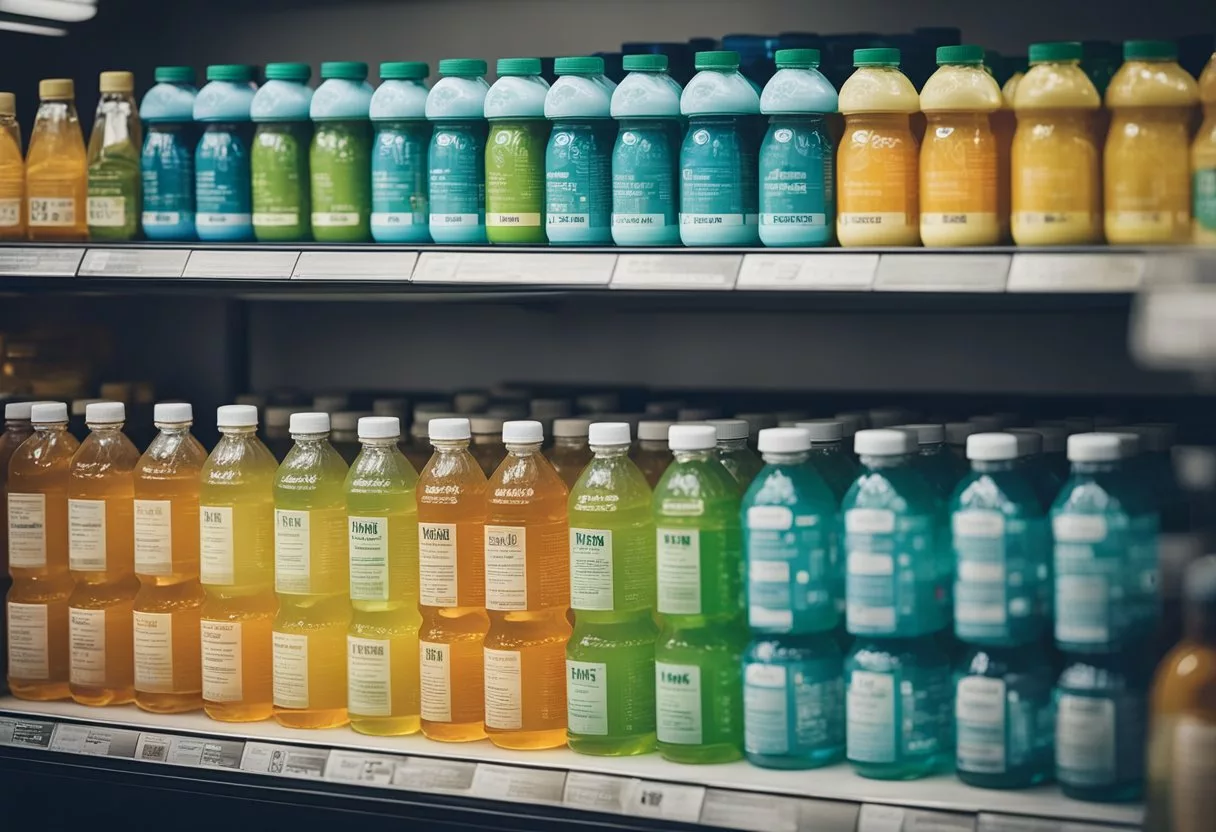
Patients with Postural Orthostatic Tachycardia Syndrome (POTS) often require increased sodium intake. Electrolyte drinks tailored for POTS provide a convenient method for maintaining sodium balance.
Key Components:
- Sodium: Essential for POTS management, with recommendations ranging from 3,000-10,000mg daily. Electrolyte drinks like LMNT contain 1000mg per serving.
- Potassium: Supports cardiovascular function. For instance, Vitassium DrinkMix offers 100 mg of potassium per serving.
- Other electrolytes: Calcium and magnesium also play roles in overall health.
Electrolyte Formulations:
Drinks must be matched to an individual’s needs, factoring in activity levels and dietary restrictions. Some options may include:
- Caffeinated formulations for those requiring an energy boost, such as Tailwind Nutrition Endurance Fuel.
- Higher sodium options like Precision Fuel & Hydration’s PH 1500, with 1500mg of sodium per liter.
Electrolyte drinks with sugar:
Sugar aids fluid and electrolyte absorption, beneficial for athletes. However, sugar content should be considered for those with sensitivities or dietary concerns.
Drink Preparation and Consumption:
Mixing instructions vary. For instance, Vitassium DrinkMix should be combined with water and can be taken throughout the day.
Considerations:
- Vegan and gluten-free options are available.
- It’s important to follow a healthcare provider’s recommendations for electrolyte intake specific to POTS symptoms and severity.
Electrolyte Drinks for Migraines
Migraines are a type of headache characterized by intense, throbbing pain, often accompanied by nausea, light sensitivity, and other symptoms. Dehydration and electrolyte imbalance are potential triggers for migraine attacks. Electrolyte drinks can help maintain the balance of essential minerals in the body, which might prevent or alleviate migraine symptoms.
- Hydration: Electrolyte drinks aid in hydration, which is crucial because dehydration can lead to or worsen migraine symptoms.
- Mineral Balance: These drinks replenish vital minerals such as sodium, potassium, magnesium, and calcium.
- Energy Supply: They provide a source of energy due to their carbohydrate content, which can help in maintaining endurance during a migraine.
According to The Healthy Consultant, some individuals find that consuming electrolyte drinks can clear brain fog and help balance blood pressure, potentially reducing the frequency of migraines.
Electrolyte-rich drinks, such as sports drinks, are often recommended during or after a migraine due to their nutrient replenishing properties. They may help stabilize the body’s fluid levels and ensure proper muscle function.
Examples of electrolyte drinks include:
- Sports Drinks: Commercially available and often contain flavoring and added sugars
- Electrolyte Infusions: Powder or liquid forms that can be added to water
- Natural Electrolyte Solutions: Coconut water or water with a pinch of salt and lemon
Electrolyte Drinks for UTI
When managing a urinary tract infection (UTI), hydration is key.
Electrolyte drinks can be beneficial as they help replenish the body’s electrolytes, which are lost during increased urination—a common symptom of UTIs.
Appropriate Drinks:
- Water: The most crucial fluid for UTI recovery, it aids in flushing out bacteria.
- Electrolyte drinks: Non-caffeinated, non-sugary drinks can help maintain electrolyte balance.
- Cranberry juice: Known for its potential benefits in preventing UTIs, though research is mixed.
Drinks to Avoid:
- Caffeinated beverages: Can irritate the bladder, worsening UTI symptoms.
- Alcoholic drinks: Like caffeine, alcohol can irritate the urinary tract.
Patients should prioritize fluids that support urinary health.
According to GoodRx[2], drinking plenty of fluids like water and certain electrolyte drinks helps stay hydrated and may alleviate some UTI symptoms.
However, it’s critical to steer clear of caffeinated and alcoholic beverages as they can exacerbate discomfort.
Electrolyte Drinks for Cramps
Muscle cramps can be a debilitating condition, and maintaining proper hydration and electrolyte balance is crucial in their management.
Electrolyte drinks are specially formulated to restore the essential minerals that are lost through sweat during exercise, namely sodium, potassium, magnesium, and calcium, which can help relieve cramps.
Individuals who experience cramps may find relief by consuming electrolyte drinks that have a balanced composition.
For example, drinks containing magnesium are particularly beneficial as this mineral plays a key role in muscle relaxation and contraction.
Here’s a simple breakdown of key electrolytes and their relevance to cramps:
- Sodium & Potassium: Help with fluid balance and nerve function.
- Magnesium: Aids in muscle relaxation.
- Calcium: Necessary for muscle contraction and function.
While electrolyte drinks might offer immediate relief for cramps, they are not a cure-all solution.
Adequate daily hydration is equally important.
One should also be mindful of their overall diet and ensure it includes sources of these minerals to prevent the reoccurrence of cramps.
For those with high-intensity exercise routines, products like Skratch Labs Sport Hydration Drink Mix have been positively reviewed.
In addition to over-the-counter options, many people can benefit from home-made electrolyte drinks where they can control the ingredients.
A simple recipe can include a mix of water, a pinch of salt (sodium), a squeeze of a citrus fruit like lemon or lime (potassium), and a bit of natural sweetener.
Electrolyte Drinks for Cancer Patients
When undergoing cancer treatment, patients often experience side effects such as vomiting, diarrhea, and excessive sweating, leading to a loss of electrolytes.
Electrolytes, like sodium, chloride, potassium, magnesium, and calcium, are essential minerals crucial for maintaining bodily functions.
Cancer Treatment Centers of America suggest incorporating beverages with electrolytes into a patient’s hydration plan to help combat these side effects.
One option mentioned is Enterade, a clinical drink formulated to facilitate optimal hydration at the cellular level.
Enterade is designed to aid in recovery, supporting the body’s natural mechanisms to recuperate from treatments or surgery.
Additionally, Verywell Health outlines choices such as milk, which naturally contains a unique mix of electrolytes and proteins.
- Milk:
- Calories: 84/cup
- Key Electrolytes: Calcium, Magnesium, Phosphorus, Potassium, Sodium
For a more personalized approach, CancerConnect shares a recipe for a homemade electrolyte drink combining water, lemon juice, apple cider vinegar, baking soda, high-quality sea salt, and a choice of fresh fruit.
Frequently Asked Questions
Electrolyte drinks are essential in managing hydration and replenishing vital minerals. They serve particular purposes based on one’s health needs and conditions.
What is the best drink to replace electrolytes?
The best drink to replace electrolytes typically contains a balanced mix of sodium, potassium, and magnesium.
For example, coconut water is highly regarded due to its natural composition and low calorie count, making it a wholesome choice for hydration.
How do electrolyte drinks benefit specific health conditions?
Electrolyte drinks are tailored to the needs of individuals with various health conditions by restoring the necessary minerals lost through sweating or illness.
For instance, people with adrenal fatigue may benefit from drinks with added sodium.
Are there electrolyte drinks suitable for diabetes patients?
Yes, there are electrolyte drinks suitable for diabetes patients that contain little to no sugar.
Some options include drinks sweetened with sugar alternatives, allowing for electrolyte replacement without impacting blood sugar levels significantly.
Which electrolyte drinks are recommended for elderly individuals?
Elderly individuals often require electrolyte drinks that are lower in sugar and have a moderate sodium content to prevent dehydration and balance electrolyte levels without overloading their system.
Can electrolyte drinks improve recovery during illness?
During illness, the body may lose fluids and salts, making electrolyte drinks valuable in improving recovery.
They provide the necessary minerals to aid in hydration and may help in faster recuperation.
How to select an electrolyte drink with no added sugars?
To select an electrolyte drink with no added sugars, read the label carefully. Look for drinks that use alternative sweeteners or are naturally flavored without the addition of sugar.
References
- Just a moment.... https://www.foodbusinessnews.net/articles/25842-hydration-innovation-on-the-rise Accessed November 4, 2025
- Access to this page has been denied. https://www.goodrx.com/conditions/urinary-tract-infection/what-to-drink-for-uti Accessed November 4, 2025
